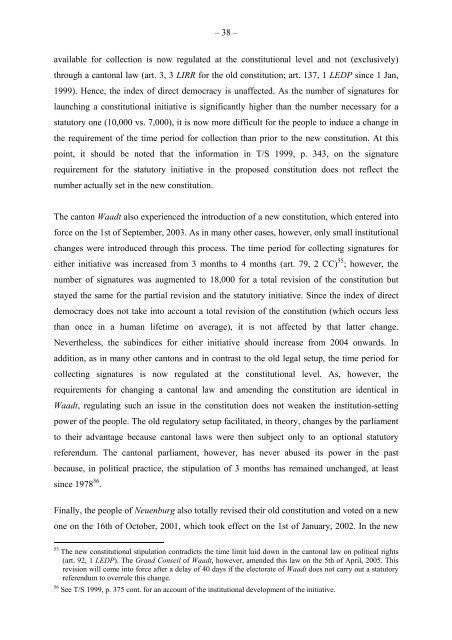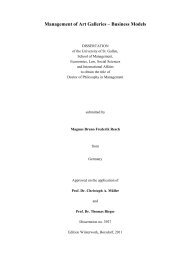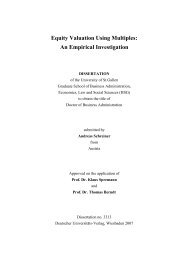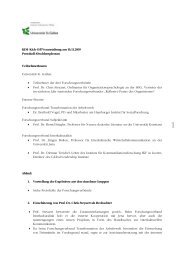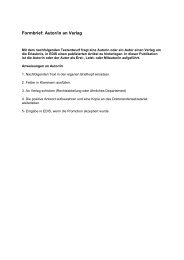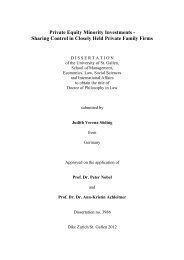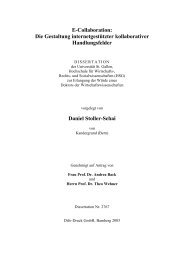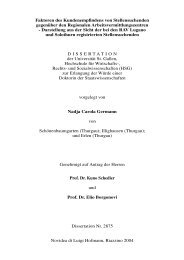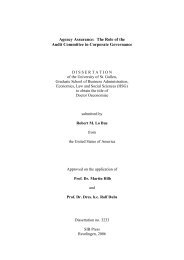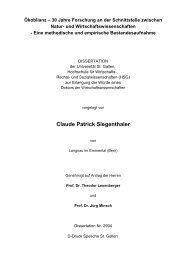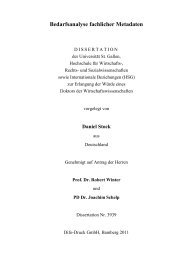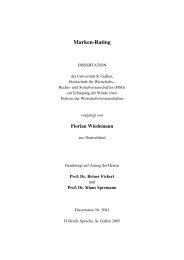The Impact of Direct Democracy on Society - Universität St.Gallen
The Impact of Direct Democracy on Society - Universität St.Gallen
The Impact of Direct Democracy on Society - Universität St.Gallen
- No tags were found...
You also want an ePaper? Increase the reach of your titles
YUMPU automatically turns print PDFs into web optimized ePapers that Google loves.
– 38 –available for collecti<strong>on</strong> is now regulated at the c<strong>on</strong>stituti<strong>on</strong>al level and not (exclusively)through a cant<strong>on</strong>al law (art. 3, 3 LIRR for the old c<strong>on</strong>stituti<strong>on</strong>; art. 137, 1 LEDP since 1 Jan,1999). Hence, the index <str<strong>on</strong>g>of</str<strong>on</strong>g> direct democracy is unaffected. As the number <str<strong>on</strong>g>of</str<strong>on</strong>g> signatures forlaunching a c<strong>on</strong>stituti<strong>on</strong>al initiative is significantly higher than the number necessary for astatutory <strong>on</strong>e (10,000 vs. 7,000), it is now more difficult for the people to induce a change inthe requirement <str<strong>on</strong>g>of</str<strong>on</strong>g> the time period for collecti<strong>on</strong> than prior to the new c<strong>on</strong>stituti<strong>on</strong>. At thispoint, it should be noted that the informati<strong>on</strong> in T/S 1999, p. 343, <strong>on</strong> the signaturerequirement for the statutory initiative in the proposed c<strong>on</strong>stituti<strong>on</strong> does not reflect thenumber actually set in the new c<strong>on</strong>stituti<strong>on</strong>.<str<strong>on</strong>g>The</str<strong>on</strong>g> cant<strong>on</strong> Waadt also experienced the introducti<strong>on</strong> <str<strong>on</strong>g>of</str<strong>on</strong>g> a new c<strong>on</strong>stituti<strong>on</strong>, which entered int<str<strong>on</strong>g>of</str<strong>on</strong>g>orce <strong>on</strong> the 1st <str<strong>on</strong>g>of</str<strong>on</strong>g> September, 2003. As in many other cases, however, <strong>on</strong>ly small instituti<strong>on</strong>alchanges were introduced through this process. <str<strong>on</strong>g>The</str<strong>on</strong>g> time period for collecting signatures foreither initiative was increased from 3 m<strong>on</strong>ths to 4 m<strong>on</strong>ths (art. 79, 2 CC) 55 ; however, thenumber <str<strong>on</strong>g>of</str<strong>on</strong>g> signatures was augmented to 18,000 for a total revisi<strong>on</strong> <str<strong>on</strong>g>of</str<strong>on</strong>g> the c<strong>on</strong>stituti<strong>on</strong> butstayed the same for the partial revisi<strong>on</strong> and the statutory initiative. Since the index <str<strong>on</strong>g>of</str<strong>on</strong>g> directdemocracy does not take into account a total revisi<strong>on</strong> <str<strong>on</strong>g>of</str<strong>on</strong>g> the c<strong>on</strong>stituti<strong>on</strong> (which occurs lessthan <strong>on</strong>ce in a human lifetime <strong>on</strong> average), it is not affected by that latter change.Nevertheless, the subindices for either initiative should increase from 2004 <strong>on</strong>wards. Inadditi<strong>on</strong>, as in many other cant<strong>on</strong>s and in c<strong>on</strong>trast to the old legal setup, the time period forcollecting signatures is now regulated at the c<strong>on</strong>stituti<strong>on</strong>al level. As, however, therequirements for changing a cant<strong>on</strong>al law and amending the c<strong>on</strong>stituti<strong>on</strong> are identical inWaadt, regulating such an issue in the c<strong>on</strong>stituti<strong>on</strong> does not weaken the instituti<strong>on</strong>-settingpower <str<strong>on</strong>g>of</str<strong>on</strong>g> the people. <str<strong>on</strong>g>The</str<strong>on</strong>g> old regulatory setup facilitated, in theory, changes by the parliamentto their advantage because cant<strong>on</strong>al laws were then subject <strong>on</strong>ly to an opti<strong>on</strong>al statutoryreferendum. <str<strong>on</strong>g>The</str<strong>on</strong>g> cant<strong>on</strong>al parliament, however, has never abused its power in the pastbecause, in political practice, the stipulati<strong>on</strong> <str<strong>on</strong>g>of</str<strong>on</strong>g> 3 m<strong>on</strong>ths has remained unchanged, at leastsince 1978 56 .Finally, the people <str<strong>on</strong>g>of</str<strong>on</strong>g> Neuenburg also totally revised their old c<strong>on</strong>stituti<strong>on</strong> and voted <strong>on</strong> a new<strong>on</strong>e <strong>on</strong> the 16th <str<strong>on</strong>g>of</str<strong>on</strong>g> October, 2001, which took effect <strong>on</strong> the 1st <str<strong>on</strong>g>of</str<strong>on</strong>g> January, 2002. In the new55 <str<strong>on</strong>g>The</str<strong>on</strong>g> new c<strong>on</strong>stituti<strong>on</strong>al stipulati<strong>on</strong> c<strong>on</strong>tradicts the time limit laid down in the cant<strong>on</strong>al law <strong>on</strong> political rights(art. 92, 1 LEDP). <str<strong>on</strong>g>The</str<strong>on</strong>g> Grand C<strong>on</strong>seil <str<strong>on</strong>g>of</str<strong>on</strong>g> Waadt, however, amended this law <strong>on</strong> the 5th <str<strong>on</strong>g>of</str<strong>on</strong>g> April, 2005. Thisrevisi<strong>on</strong> will come into force after a delay <str<strong>on</strong>g>of</str<strong>on</strong>g> 40 days if the electorate <str<strong>on</strong>g>of</str<strong>on</strong>g> Waadt does not carry out a statutoryreferendum to overrule this change.56 See T/S 1999, p. 375 c<strong>on</strong>t. for an account <str<strong>on</strong>g>of</str<strong>on</strong>g> the instituti<strong>on</strong>al development <str<strong>on</strong>g>of</str<strong>on</strong>g> the initiative.


